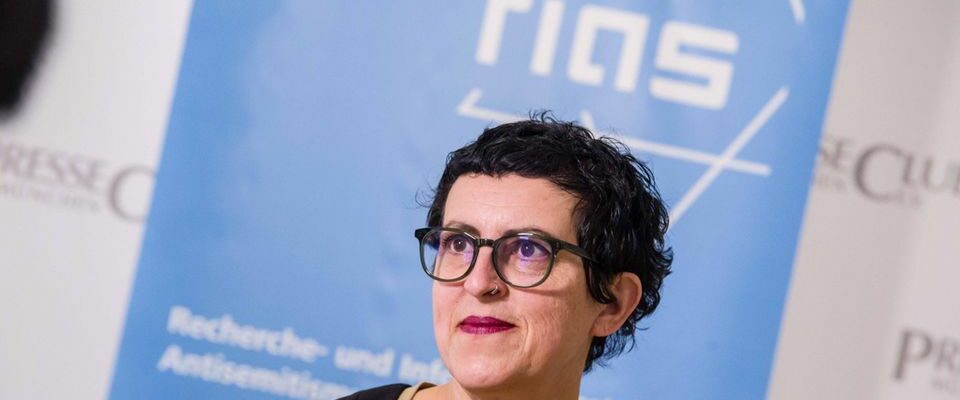Annette Seidel-Arpacı heads the Bavarian research and information center RIAS, which documents anti-Semitic incidents and attacks and supports those affected. Your work is particularly urgent right now.
As early as the evening of October 7th, Annette Seidel-Arpacı had an idea of what was to come for her and her team. The news of Hamas’s cruel terrorist attack in Israel was only a few hours old when RIAS Bayern (which stands for anti-Semitism research and information center) received the first calls from worried and angry Jews. Because they were threatened, insulted, treated with hostility, online, on the street. “It was immediately clear to me: This is not just about Israel. The hatred is directed against Jews, no matter where they live.” And no matter what political camp you belong to.
Annette Seidel-Arpacı, 56, has experienced firsthand what exclusion means. She comes from Upper Palatinate, studied at the Center for Jewish Studies in Leeds, England and lived in Great Britain for many years. She has headed the Bavarian research center RIAS since it was founded in 2019.
© Zuma Wire / imago images
Between October 7th and November 9th, RIAS recorded 148 anti-Semitic incidents in Bavaria, almost three times as many as in the same period last year. 91 percent of them are directly related to the terrorist massacre in Israel.
“I’m horrified. But not surprised,” says Annette Seidel-Arpacı.
The goal: document anti-Semitism
RIAS Bavaria is part of a network of twelve state offices. Berlin started in 2015. In 2019, Bavaria was the first state to join, supported by the Bavarian Ministry of Social Affairs. Their goal is to document anti-Semitism. For example, videos and screenshots of offline and online incidents in which Jewish people are the targets of verbal or physical attacks. Regardless of whether these are crimes.
RIAS helps those affected if they want to file a report and provides contact with victim counseling organizations. The club itself cannot provide this support. “But if someone describes their experiences and concerns to us on the phone, then of course we listen. It can take an hour or two,” says Seidel-Arpacı. A big task for the five employees: “We are currently working at the limit.”
Seidel-Arpacı has experienced exclusion herself
Annette Seidel-Arpacı was born in 1967 in a small town in Upper Palatinate, the daughter of a German mother and a Turkish guest worker. A Bavarian child with her father’s dark hair, who grew up with the natural feeling of belonging. Until she learned the hard way in elementary school that not everyone saw it that way. For example, the mother of a classmate who forbade her daughter to play with “someone like that.” An experience that helped her as a teenager to empathize with the lifestyle of German Jews at the beginning of the Nazi era. Many people at the time could not imagine that their own government was preparing to wipe them out. They were German citizens, just like everyone else! So they underestimated the looming threat.
Of course, the situation cannot be equated, and her own experiences are just one of many reasons for her commitment, emphasizes Seidel-Arpacı: “anti-Semitism concerns everyone, regardless of origin. Because the dangerous thought patterns are widespread worldwide.”
Anti-Semitism creates dangerous alliances
This can now be observed again in the discussion about the war in the Middle East: “Israel is not believed, the state and even the survivors of the massacres are reflexively accused of lies and propaganda, no matter what evidence is provided. You can also see this attitude in Germany: the old anti-Semitic image of the cunning, powerful, lying Jew.”
According to the current “Mitte Study” by the Friedrich Ebert Foundation, which was carried out weeks before October 7th, 5.7 percent of those surveyed agreed with anti-Semitic statements – well more than twice as many as in 2021; 15.3 percent are in a gray area. An overall social mood, in which a Bavarian deputy prime minister can simply sit out the discussion about an anti-Semitic pamphlet from his youth, without suffering political damage. In which the partly right-wing extremist AfD achieved double-digit election results Bavaria and Hesse enters.
“Many Jews in Bavaria tell me: The circles in which I feel really safe and unconditionally supported have shrunk massively,” says Seidel-Arpacı. “The lack of empathy is shocking.” Anti-Semitism in Germany creates unholy alliances, is how Seidel-Arpacı assesses it: between people with German roots who have never dealt with their own traditional resentments, and immigrants who grew up with anti-Semitic prejudices and hatred in their countries of origin. Conspiracy theorists from the lateral thinker camp said: “They are obviously still thinking about how they are currently positioning themselves, but these circles repeatedly signal understanding for Palestinian terror.”
The demand: more education and better law enforcement
What could help? “On the one hand, a massive change in educational work, but not just with children. On the other hand: repression, determined criminal prosecution.” After all, since Bavaria has had anti-Semitism commissioners for the police and judiciary, the authorities have been much more aware of the issue. What also encourages you:When younger Jews raise their voices and defend themselves, with their own organization but also together with non-Jewish supporters.
Small glimmers of hope. There is currently nothing more for Annette Seidel-Arpacı and her colleagues. Her assessment is sober, but she is not resigned. “Everything we experience shows: There is no alternative to combating anti-Semitism. And that doesn’t mean it’s related to our work.”
